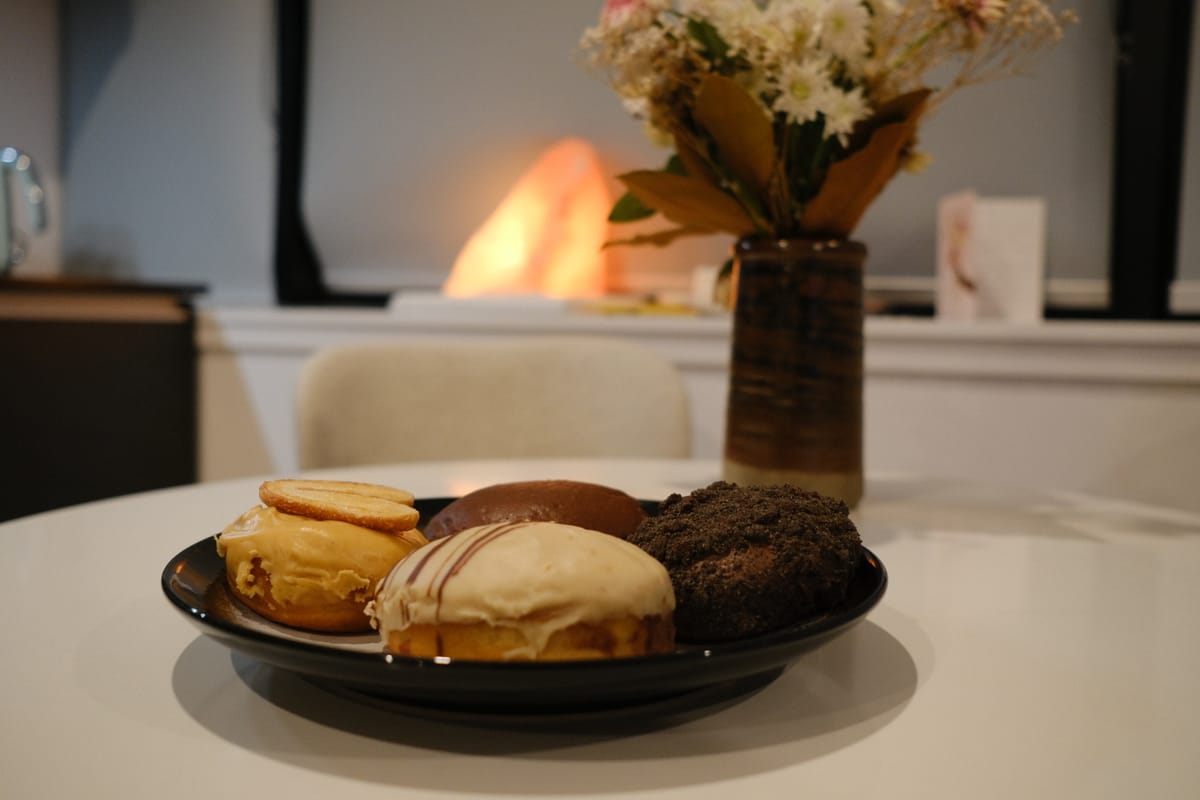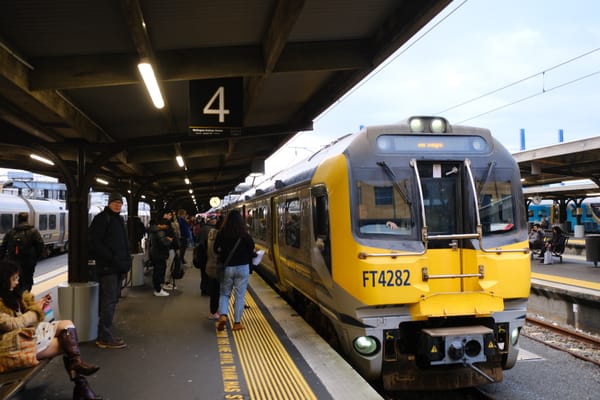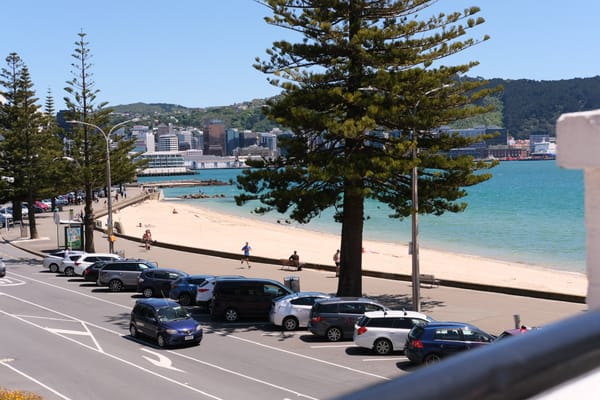How Vonuts is modernising our food traditions
This comfy pastel pink vegan donut shop is a fantastic example of how to connect our family’s food traditions, our memories and culture, to a low pollution food system fit for the future.

What we eat is not just our choice. At its heart, food is social.
The kai we consider normal is defined by culture as well as our guts. Since we can eat plants and animals, we have choice of everything from lavender flowers to fertilised duck eggs.
There's an abundance of choice in food – and poison hides everywhere. It would be too much effort if you needed to evaluate whether every bit of food was safe.
We developed culture around food to understand what is safe and what is poison. It is knowledge built like layers of a cake, each generation updating our culinary habits to match the moment.
Straying from that knowledge can feel strange. I've been mostly vegetarian for years because of climate change. At first, eating differently felt isolating.
Eating is core to our most personal rituals. We share hāngi during Matariki, stuffing at Christmas, delicious tiny pies at funerals. Changing diet can feel like an attack on what make us human: our treasured memories and relationships.
That is what makes food such a challenge to change in a warming world. Some food has a far bigger pollution footprint than others. Dairy cattle pollute more in New Zealand than all transport combined. Adding more plants and fewer animal products in our diets is one of the most impactful things we can do to respond to rising temperatures.
Achieving that practically and financially is enough of a challenge. But more than that, there is something socially uncomfortable, too. Changing diets can feel like a threat to memories, rituals, and taste shaped by culture. It feels like something bigger than calories.
I was pondering all of this while I chatted with Laura Reinisch, the owner of Vonuts on Willis Street.
I first heard of Laura and her donuts through her partner Martini when we worked together. Laura and I crossed paths when I worked at Aro Digital, too – she delivered sweet treats to our team sometimes. Her donuts are delicious.
This comfy pastel pink vegan donut shop is a fantastic example of how to connect our family’s food traditions, our memories and culture, to a low pollution food system fit for the future.

How it started
Laura started the whole project because, after being vegan for a while, she wanted to make great plant based options inspired by her grandmother's dairy filled donuts.
“They’re based on my grandma’s recipe… I wasn’t this big home baker. I just started doing it. I want to eat vegan donuts, I’ll just have to make them. So I was like, hey, Uma, can you tell me how you do those donuts?”
She tinkered and tested with different plant milks. "It was a lot of trial and error." For three weeks every single day she tested and refined her donut recipes, inspired by her grandmother.
Rather than feeling limited by her constraints, she got excited by them. Each challenge is a puzzle: how to make fantastic vegan chocolate ganache, or how to be inspired by seasonal fruits.
When she pondered making a business out of her vegan donuts, Martini and her community encouraged her. When she and Martini moved from the Hawkes Bay, it was the perfect chance to try it.
Starting out, Laura was warmly accepted by vegans across the city.
“It gives the people back what they’ve always been craving and then haven’t had since they’re vegan… people want donuts.”
Vonuts has used plant based baking to bring joy and treats to people who otherwise might miss out based on diet. Memories of donut days can be restored with options that fit people's preferences. Each donut is more than a sweet treat. It connects us to memories and forges new ones.
Laura started doing deliveries, sold donuts at two/fiftyseven, then Press Hall, and now sits on Willis Street. The climate in Wellington right now for small businesses is “tough”, Laura told me. Navigating a difficult economy can feel like catching an eel: exhausting.
Something interesting that she’s found recently is her new Willis Street location has attracted more people that eat meat and dairy. It’s a big change compared to her previous locations, where she was mostly selling donuts to sweet-toothed vegan Wellingtonians.
"There were lots of people who really wanted dairy milk and then ended up with like, this is amazing. And that feels really nice."
It's this exposure to different things, the willingness of people to try something different, that is key. In order to change our culture around food to be better suited for a warming world, we need to start with a bit of experimentation.
Those willing to give Laura's donuts a try have an abundance of options. There are the comforting classics, filled and regular donuts. There are more zany and experimental. I particularly loved the hot honey apple glaze that Laura had when I visited.
The donuts are not perfect mimics. Cream is hard to replicate with plants, especially texture. Laura’s donuts are sweeter, surprisingly fluffy, layered. They are different to their dairy cousins. Crucially, they are super delicious.
Baking the next layer of food culture
Laura, and other places like Dirty Donuts, are at the cutting edge of our food culture. They are baking the next layer of cake to sit above what our ancestors have painstakingly made for us.
Our food will change as our climate changes. Experimenters like Laura are showing how to bring tradition and delight along with us. Rather than thinking about our changing diets through calories, they're baking in opportunities to connect us to our memories. That will make the transition a lot easier.
More than that, there are new memories being made every day on Willis Street. Workers looking for relief in their lunch break, families away from home exploring the city, tamariki begging for a treat.
We don't need to shirk our memories and love for the past to change. We can bring it with us, one donut at a time.





